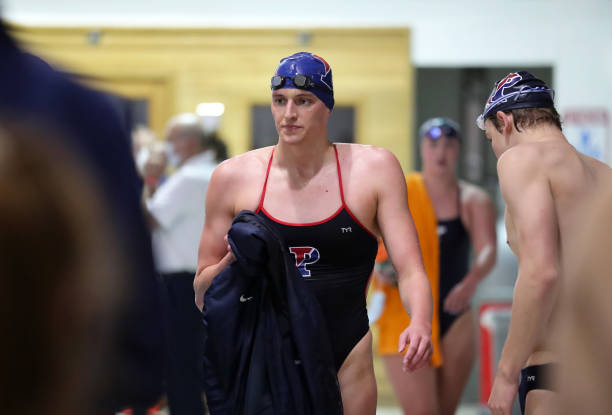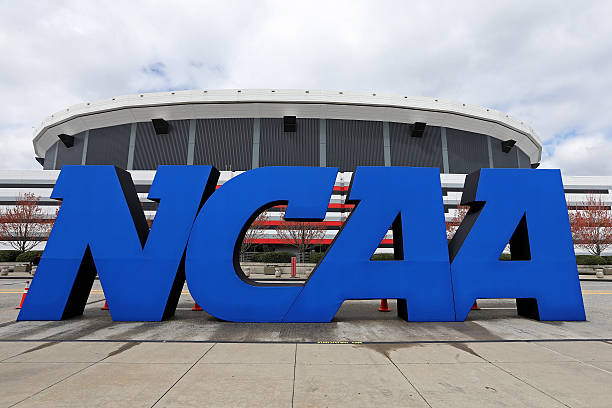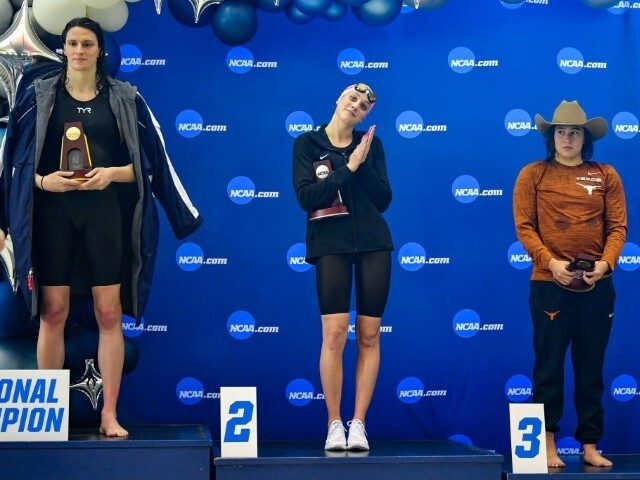A group of 16 female college athletes have launched a lawsuit against the National Collegiate Athletics Association (NCAA) for allowing trans athletes to compete against them and being forced to use a female locker room with transgender swimmer Lia Thomas, who still has “full male genitalia.”
According to The Times & Sunday Times, the 16 female litigants are charging that the NCAA committed “institutionalized cheating and discrimination” by supporting and attempting to include Thomas.
The 156-page lawsuit, which was filed in the United States District Court in the northern district of Atlanta, Georgia, on Thursday, alleges that up to 300 college women were forced to use the same locker rooms and showering facilities that Thomas used during his time on the women’s swim team at the University of Pennsylvania.
Thomas infamously won the NCAA Division 1 swimming championships in 2022. He won the title in the women’s 500-yard freestyle event, beating two females, both Olympic silver medal winners.

Lia Thomas of the Pennsylvania Quakers after winning the 500-meter freestyle event during a tri-meet against the Yale Bulldogs and the Dartmouth Big Green at Sheerr Pool on the campus of the University of Pennsylvania on January 8, 2022, in Philadelphia, Pennsylvania. (Hunter Martin/Getty Images)
The suit, spearheaded by former general counsel at the United States Anti-Doping Agency Bill Bock, includes more than just swimmers. Also signing on are female college volleyball players, tennis, and track and field athletes who feel that the NCAA must be held accountable for supporting trans athletes competing as women.
The suit further claims that the NCAA made a “radical departure from Title IX’s original meaning” to protect women’s sports.
Since the Thomas controversy, the NCAA has updated its trans athlete policy to require trans athletes to submit documentation from a medical provider proving claims of transgenderism at least twice annually and within four weeks before the selection date for a championship event.

A detail of the giant NCAA logo is seen outside the stadium on the practice day before the NCAA Men’s Final Four at the Georgia Dome on April 5, 2013, in Atlanta, Georgia. (Streeter Lecka/Getty Images)
The NCAA also says it will follow Olympic swimming rules that now prohibit any trans athlete who underwent puberty before his transition. This rule would bar Lia Thomas from competing as a woman.
But Bock says the new rules don’t go far enough.
“It is time for each of the NCAA’s sponsors, and for all sports organizations that care about fair competition and safe sport, to recognize the NCAA has institutionalized cheating and discrimination against women and must be reformed,” he said, adding, “We need to hear them speak up for women and disassociate themselves from the NCAA and its conduct.”
Women’s sports advocate Riley Gaines is one of the women who have joined the lawsuit. Gaines tied for fifth place in the 2022 NCAA championships in the 200-yard freestyle. Meanwhile, four of the women who have joined the lawsuit have opted to stay anonymous for fear of retaliation against them by trans activists.
The suit goes on to allege that “without notice to female swimmers competing in the 2022 NCAA Championships, the NCAA and . . .one or more other state actors or actors with apparent state authority … changed the designation of the locker rooms to be used by the women
swimmers … to ‘unisex’ locker rooms. And directed women swimmers and teams that Thomas was entitled to use all designated locker rooms allocated to the women swimmers and teams.”
“This change was made so that Thomas, a fully grown adult male with full male genitalia, would use the same locker rooms to be used by more than 300 female student-athletes, depriving the female student-athletes of sex-separated women’s locker room facilities and bathroom and restroom facilities where their right to bodily privacy could be protected, exposing the women to shock, humiliation, and embarrassment in violation of their constitutional right to bodily privacy,” the suit says.
The suit states that the 16 women are, therefore, “entitled to declaratory relief, compensation, punitive damages, and attorneys’ fees.”
In a statement, Bock told the paper, “What the NCAA allowed to happen to hundreds of female athletes in locker rooms in Atlanta two years ago was nothing less than exploitation and a disgraceful violation of women’s rights to bodily privacy.
“The NCAA’s president, Charlie Baker, and university presidents and athletic directors ought to be called to testify before Congress tomorrow.
“The unfair advantage the NCAA gives to male athletes to compete against women is as bad as any doping case I have been involved in.
“The real March Madness [a reference to the annual NCAA basketball championship] is how the NCAA sold out hundreds of female student-athletes.”
Follow Warner Todd Huston on Facebook at: facebook.com/Warner.Todd.Huston, or Truth Social @WarnerToddHuston

COMMENTS
Please let us know if you're having issues with commenting.